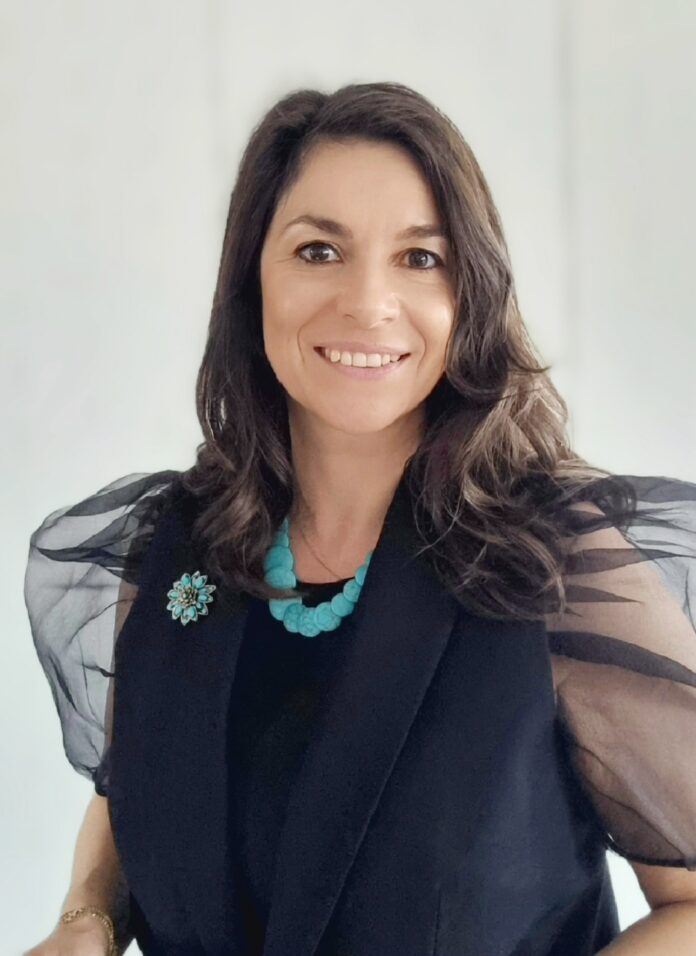By Alexandra Paucescu
Originally from Ecuador, Maria Medina embarked on an international journey from a very young age, traveling to Costa Rica and US, as an infant, living for ten years back in Ecuador and then moving to The Hague in 2010.
She remembers: ‘growing up, I attended a school where most children came from diplomat families. Watching the community come and go every four years was a normal part of life. This environment taught me to detach from people and places and to view change as a phase of life with its own mission. I’ve learned to cherish past experiences as wonderful memories that have propelled me to the next stage in life. This mindset has made me adaptable and open to new opportunities, appreciating the unique experiences that each phase brings.’
‘My academic and professional pursuits led me from Salamanca, Spain, where I spent a year during an Erasmus exchange for my law degree, to Berlin for a Master’s in Public Policy, and eventually to Lisbon, Portugal in May 2023. Growing up, I always felt happiest in warmer climates, close to my family. Although initially only my parents and sister were nearby after moving to the Netherlands, I’ve always carried a sense of home within myself, which I’ve come to cherish more as I’ve gained financial independence. Now, I make it a priority to stay close to loved ones, a choice that brings me the greatest happiness.’

Her career began with an internship at Philips in Amsterdam, which prompted her to defer her law studies and explore various internships, including pro-bono work, assisting professors and organizing law conferences. In Berlin, she gained expertise in consultancy focused on digitizing the public sector. To enhance her language skills and cultural understanding, she moved to Portugal for an intensive five-month Portuguese course, meanwhile significantly broadening her professional landscape.
She tells me: ‘back in Berlin, I engaged with the startup scene, which led me back to Portugal, transitioning from digital marketing to an executive role in consultancy. Disillusioned with consultancy, I moved into operations at an AI-led finance company and launched my real estate career with a French brand in Lisbon, using my negotiation and market analysis skills to assist clients in finding ideal properties.’
Since leaving academia in September 2017 to work full-time, her life has been defined by continuous change and personal growth. She learned to focus on her own journey. ‘For years, I haven’t lived in the same city for more than a year or maintained the same group of friends for longer than six months, giving me ample time for self-reflection. Initially, I tried various paths to determine what I didn’t want, which only clarified my dislikes without revealing my true desires. Moving to Portugal shifted my perspective, prompting me to pursue genuine interests and leave an unfulfilling corporate path. I learned to value my strengths and focus on leveraging them rather than seeking discomfort for growth. This taught me that personal growth could be comfortable and aligned with my passions, allowing me to make choices that are both challenging and fulfilling. This approach has helped me carve out a satisfying and authentic path for myself.’
She tells us that Portugal offers a high quality of life with a lower cost of living compared to other Western European countries, which makes it appealing to many expatriates. The warm Mediterranean climate boasts over 300 days of sunshine annually, perfect for year-round outdoor activities. Portugal is well-connected internationally, with major airports in Lisbon, Porto, and Faro, and efficient public transportation, including high-speed trains. Its robust healthcare system provides high-quality public services and private options for faster specialist access. Education is also excellent, with numerous international schools offering multilingual curricula.
Maria mentions the welcoming culture which helps newcomers settle easily, and the Portugal’s vibrant expat community including retirees, digital nomads, and families, all attracted by its relaxed lifestyle, natural beauty and unique urban-coastal living blend.
Maria invites us to discover this beautiful country. She made her job out of offering unique insights into the Lisbon real estate market.
She tells me proudly: ‘my career has spanned from compliance work in Amsterdam to policy work in Berlin and engaging with Portugal’s dynamic startup scene. This experience has honed my skills in management, negotiation, and market analysis, enabling me to provide bespoke real estate solutions. I am dedicated to helping clients find their ideal residential or commercial properties, ensuring a seamless and fulfilling experience. My approach combines a deep commitment to understanding individual preferences with my expertise in the local market, aiming to help clients discover properties that not only meet their needs but also enhance their lives in this picturesque region.’
She is a smart and ambitious woman. ‘I aim to be the go-to real estate broker for diplomatic missions in Portugal, and later specialize in larger properties like hotels and resorts.’ Her roots are not denied, it seems.
She works hard to achieve her dreams and shape her future from a great potential. ‘I live by Seneca’s words: “Luck is when preparation meets opportunity.” My continuous learning is my preparation, and as a real estate broker, I create opportunities. I aim to generate luck for my clients and myself, driving me to consistently enhance my skills and seize beneficial opportunities.’
Go all the way, Maria!
About the author:
Alexandra Paucescu- Author of “Just a Diplomatic Spouse” Romanian, management graduate with a Master in business, cultural diplomacy and international relations studies.
She speaks Romanian, English, French, German and Italian, gives lectures on intercultural communication and is an active NGO volunteer.


























